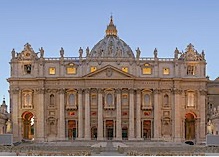The Pope’s audience to the chapters of six religious congregations
“Sowing the beauty of Christ in the folds of history”
You are representatives are different religious institutes and orders of various foundations, whose origins range from the 16th to the 20th century: Minims, Clerics Regular Minor, Augustinian Sisters of Divine Love, Clerics of St. Viator, Reparatory Sisters of the Sacred Heart and Missionaries of St. Anthony Mary Claret.
In your variety, you are a living image of the mystery of the Church, in which: “to each is given a special manifestation of the Holy Spirit for the common good of all” (1 Cor 12:7), so that the beauty of Christ may shine forth in all its light in the world.
It is no coincidence that the Church Fathers defined the spiritual path of consecrated men and women: “philokalia, that is, love for divine beauty, which is the radiance of divine goodness”
(Saint John Paul II, Apostolic Exhortation Evangelii Gaudium, n. Vita consecrata, 19).
And this path, how far it is from internal struggles, so often from interests other than those of love.
I would therefore like to pause and reflect with you on two aspects of your life that have a lot to do with this: beauty and simplicity.
First: Beauty.
Truly your histories, in different circumstances, times and places, are stories of beauty,
Because in them shines the grace of God’s face: the grace that we see in the Gospels in Jesus,
in his hands clasped in prayer in moments of intimacy with the Father (Matthew 14:23 – And after he had dismissed the crowds, he went up into the hills by himself to pray. When evening came, he was there alone),
in his heart full of compassion (see Mark 6:34-44 in a footnote below),
in his eyes burning with zeal when he denounces injustice and abuse
(see Matthew 23:13-33 in a footnote below),
in his calloused feet, scarred by the long marches with which he reached even the most disadvantaged and marginalized peripheries of his country (cf. And Jesus went about all the cities and villages, teaching in their synagogues and preaching the gospel of the kingdom, and healing every disease and every infirmity.).
Your founders, under the impulse of the Holy Spirit, have been able to grasp the features of this beauty, and to respond to it in different ways, according to the needs of their times, writing wonderful pages of concrete charity, courage, creativity and prophecy, dedicating themselves
in the care of the weak, the sick, the elderly and children.
in the formation of young people,
in missionary proclamation.
These are the pages that are entrusted to you today, so that you may continue the work that they have begun.
The invitation, then, in your Chapter work, is to “take up their baton” .
It is up to you to take it up and go forward — and to continue, like them, to seek and sow the beauty of Christ in the concreteness of the folds of history,
Listening first of all to the love that animated them, and then allowing yourselves to be challenged by the way in which they responded to you: by what they have chosen and by what they have renounced, perhaps with suffering, in order to be for their contemporaries a clear mirror of the face of God.
Secondly: Simplicity
And this brings us to the second point: simplicity.
Each of you, in different circumstances, has chosen the essential—he has chosen the essential, eh! — and he renounced the superfluous, allowing yourselves to be forged day after day by the simplicity of God’s love as it is revealed in the Gospel.
Yes, because God’s love is simple and his beauty is simple, it is not a sophisticated beauty, no.
It’s simple, it’s easy.
Therefore, as you prepare for your meetings, you too ask the Lord to be simple, personally and also simple in the synodal dynamics of the journey together.
Strip yourselves of everything that is not useful or that can hinder listening and harmony in your discernment processes;
Rid yourselves of calculations, of ambitions — but ambition, please, is a plague in the consecrated life;
Be careful of this: envy is a plague — envy is ugly in a community life;
I like to see envy as the “yellow disease”, a bad thing — demands, rigidity and every other ugly temptation of self-referentiality.
In this way you will be able to read the present together with wisdom, in order to read in it the “signs of the times” (Past. Gaudium et Spes, 4) and to make the best decisions for the future.
As men and women religious, moreover, you embrace poverty precisely in order to empty yourselves of everything that is not the love of Christ and to allow yourselves to be filled with its beauty, to the point of letting it overflow into the world (cf. Encyclical Letter, n. Laudato si’, Prayer for our land), wherever the Lord sends you and to whatever brother or sister He places on your journey, especially through obedience.
And this is a great mission! It’s a big mission.
And the Father entrusts it to you, fragile members of the body of his Son, precisely so that through your humble “yes” the power of his tenderness, which goes beyond all possibility, and which permeates the history of each of your communities, may be manifested.
And do not abandon prayer, a prayer of the heart; do not abandon the moments in front of the tabernacle in which we talk to the Lord, speak to the Lord and let the Lord speak to us.
But prayer from the heart: not the prayer of parrots, no, no.
The one that comes from the heart and that makes us go forward on the path of the Lord.
Dear sisters and brothers, I thank you for the great good you do in the Church, in so many parts of the world, and I encourage you to continue your work with faith and generosity!
Pray for vocations. It is necessary that you have successors who carry on the charism. Pray, pray.
And be careful with your formation: let it be a good formation.
I bless you, I pray for you and I ask you, please, to pray for me. Thank you.
Footnotes
(Mark 6:34-4)
As he landed he saw a great throng, and he had compassion on them, because they were like sheep without a shepherd; and he began to teach them many things. 35 And when it grew late, his disciples came to him and said, “This is a lonely place, and the hour is now late; 36 send them away, to go into the country and villages round about and buy themselves something to eat.” 37 But he answered them, “You give them something to eat.” And they said to him, “Shall we go and buy two hundred denarii[a] worth of bread, and give it to them to eat?” 38 And he said to them, “How many loaves have you? Go and see.” And when they had found out, they said, “Five, and two fish.” 39 Then he commanded them all to sit down by companies upon the green grass. 40 So they sat down in groups, by hundreds and by fifties. 41 And taking the five loaves and the two fish he looked up to heaven, and blessed, and broke the loaves, and gave them to the disciples to set before the people; and he divided the two fish among them all. 42 And they all ate and were satisfied. 43 And they took up twelve baskets full of broken pieces and of the fish. 44 And those who ate the loaves were five thousand men.
Matthew 23:13-33
13 “But woe to you, scribes and Pharisees, hypocrites! because you shut the kingdom of heaven against men; for you neither enter yourselves, nor allow those who would enter to go in.[a] 15 Woe to you, scribes and Pharisees, hypocrites! for you traverse sea and land to make a single proselyte, and when he becomes a proselyte, you make him twice as much a child of hell[b] as yourselves. 16 “Woe to you, blind guides, who say, ‘If any one swears by the temple, it is nothing; but if any one swears by the gold of the temple, he is bound by his oath.’ 17 You blind fools! For which is greater, the gold or the temple that has made the gold sacred? 18 And you say, ‘If any one swears by the altar, it is nothing; but if any one swears by the gift that is on the altar, he is bound by his oath.’ 19 You blind men! For which is greater, the gift or the altar that makes the gift sacred? 20 So he who swears by the altar, swears by it and by everything on it; 21 and he who swears by the temple, swears by it and by him who dwells in it; 22 and he who swears by heaven, swears by the throne of God and by him who sits upon it. 23 “Woe to you, scribes and Pharisees, hypocrites! for you tithe mint and dill and cummin, and have neglected the weightier matters of the law, justice and mercy and faith; these you ought to have done, without neglecting the others. 24 You blind guides, straining out a gnat and swallowing a camel! 25 “Woe to you, scribes and Pharisees, hypocrites! for you cleanse the outside of the cup and of the plate, but inside they are full of extortion and rapacity. 26 You blind Pharisee! first cleanse the inside of the cup and of the plate, that the outside also may be clean.27 “Woe to you, scribes and Pharisees, hypocrites! for you are like whitewashed tombs, which outwardly appear beautiful, but within they are full of dead men’s bones and all uncleanness. 28 So you also outwardly appear righteous to men, but within you are full of hypocrisy and iniquity. 29 “Woe to you, scribes and Pharisees, hypocrites! for you build the tombs of the prophets and adorn the monuments of the righteous, 30 saying, ‘If we had lived in the days of our fathers, we would not have taken part with them in shedding the blood of the prophets.’ 31 Thus you witness against yourselves, that you are sons of those who murdered the prophets. 32 Fill up, then, the measure of your fathers. 33 You serpents, you brood of vipers, how are you to escape being sentenced to hell?[c]

